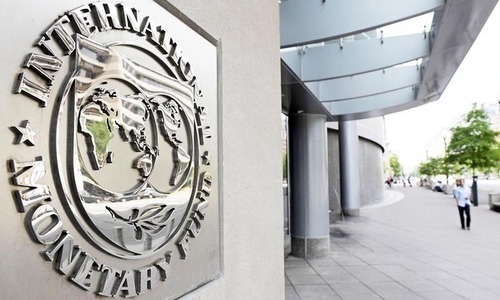IMF sees mounting risks, sharp drop in growth for Pakistan next year
WASHINGTON: The International Monetary Fund projected on Wednesday that Pakistan’s growth will moderate to 4.7 per cent in fiscal year 2019 from 5.6pc in 2018.
In its regional economic outlook update for the Middle East, North Africa, Afghanistan and Pakistan (MENAP) region on Wednesday, the IMF notes that “an increase in macroeconomic vulnerabilities and domestic policy slippages have weakened Pakistan’s economic outlook, with growth now projected to moderate to 4.7pc in FY19”.
In January, the IMF said it expected growth in Pakistan to pick up in 2018-19. The government has targeted 6.2pc growth for next year in its latest budget.
Contrary to the govt target of 6.2pc growth for next year, the Fund says it is likely to be 4.7pc
The report credits improved energy supply, investment related to the China-Pakistan Economic Corridor, and strong credit growth for the raise in Pakistan’s growth to an estimated 5.6pc in the outgoing FY18, from 5.3pc last year.
Editorial: Grim picture by IMF
The report, however, places Pakistan among the countries where “delays in implementation or completion of structural reforms and political and policy uncertainty” continue to weigh on growth. Besides Pakistan, Jordan, Morocco, Tunisia and Lebanon are also placed in this category.
Pakistan is also placed among the countries where upcoming elections and a more challenging political environment could slow the reform process.
“A high perception of corruption and lack of transparency in some of these countries could not only affect macroeconomic outcomes directly, reducing investment and productivity, but could also heighten social tensions and hinder reform,” the IMF warns.
The report notes that some countries in the MENAP region are slowly taking steps to improve governance and transparency while additional efforts are also being made to bolster the business environment, with Pakistan recently strengthening its bankruptcy framework.
After three years of decline, exports of MENAP oil-importing countries grew by 6.4pc in 2017 and are projected to accelerate by 8.4pc in 2018 and 8.6pc in 2019.
In Pakistan, Egypt and Tunisia, this was largely due to improved external demand and greater exchange rate flexibility while Pakistan also benefited from a pickup in cotton prices.
Import growth in MENAP nations is projected to slow to 4.8pc in 2018 from 6.8pc in 2017 and remains broadly steady around 5.5pc over the medium term.
In Pakistan, Djibouti and Mauritania, this import compression “partly reflects an anticipated slowdown in capital imports for infrastructure projects”.
The IMF notes that public debt levels in non-oil producing MENAP countries remain elevated, exceeding 80pc of GDP in several nations.
“Such large debt stocks represent a significant burden on the economy. Debt service crowds out growth-enhancing expenditures,” the report adds with a warning that large debt stocks also add to external vulnerabilities given the large share of external debt.
“This burden will increase since financing costs are likely to rise in line with the expected tightening of monetary policy in advanced economies,” says the IMF, while urging borrowing nations to focus on efforts to reduce debt.
The IMF, however, points out that inflation pressure in the region has abated, with inflation broadly stable at about 12pc. In Pakistan and Morocco, decline in food prices helped bring the inflation down while in some countries monetary tightening also helped.
Read: If we knock on IMF’s doors
A review of the banking sector in MENAP countries shows that non-performing loans remain high but are declining. In most MENAP nations, banking sectors have generally remained stable, liquid, and adequately capitalised.
Pakistan, Egypt, Lebanon and Jordan are among the countries that are beginning to embrace financial technology to increase financial inclusion.
For enhancing resilience, Pakistan and Egypt are advised to enhance deposit insurance arrangements.
The IMF notes that tighter and more volatile global financial conditions could increase borrowing costs further for MENAP oil importers, adding to existing fiscal sustainability concerns, weighing on bank balance sheets, and undermining private sector activity. A 200-basis point increase in interest rates relative to the baseline would raise financing costs for Lebanon, Egypt, and Pakistan by 0.9, 0.8, and 0.7 percentage point of GDP, respectively.
“Tightening of global financial conditions could precipitate capital outflows from the region that would put pressure on external positions and exchange rates,” the report warns.
Over all, growth in the MENAP region is estimated to have reached 4.2pc in 2017 and is projected to increase further to 4.7pc this year and to 5pc on average during 2019–23. Some countries may experience faster growth.
Further strengthening of the outlook for the euro area will continue to support economic activity in MENAP through exports, remittances, foreign direct investment, and tourism.
Published in Dawn, May 3rd, 2018














































